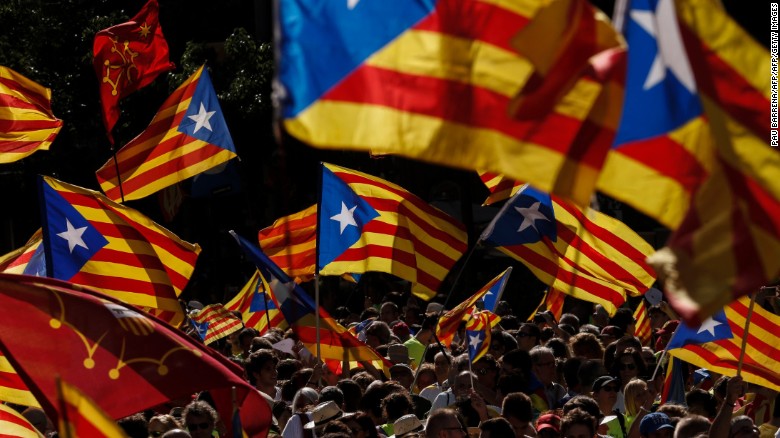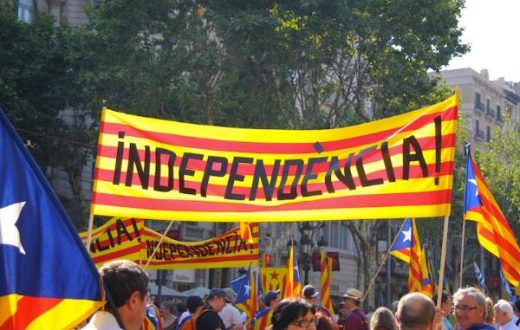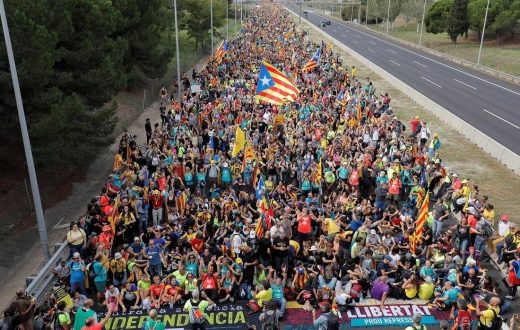Daniel Cerdà is a famous artist in Barcelona, with an incredible talent for the guitar. But moreover, he’s also a graduate in Law from the University of Barcelona in Catalonia. With a father originally from Alicante, and a mother from Switzerland, this versatile man reflected a lot on the last separatist events in Barcelona, and even wrote a short essay about it. Here is his poignant interview that takes us from his childhood to the school system the ‘Generalitat’ implemented.
I’ve always thought that political opinions are determined by our personal experiences. In my case, the way I think and behave are strongly marked by the fact that my mother is from Switzerland, my father from Alicante and I was born in Barcelona.
When I was a child living in Switzerland, some Swiss took good care of reminding me that I was just ‘a fucking Spanish migrant’. Shortly after that, when I returned to Spain and moved next to Alicante, some people just stayed focused on my Catalan origins, and I was sometimes called ‘the fucking ‘catalufo’.
The worst is that, when I came back to Barcelona, some Catalans insulted me because I used to live outside of Catalonia.
Of course, in the three cases, this verbal violence was more the exception than the rule, but what is sure is that you will always meet someone who is willing to emphasize his or her difference from the rest of the group.
At the end, since the childhood my experiences have taught me to seek a refugee in the independent Republic that my home is. I also refused to participate in any kind of nationalism. I think nationalism is by definition excluding, and highlights differences that are supposed to make a certain group better than another.
On another hand, with the passing of the years, I’ve overcome all this. I reconciled with these different origins that are integral parts of my personality. What happened to me has reinforced my trans-nationality. I know that this concept of ‘citizen of the world’ would disgust many separatists, but they should know that their concept of ‘nation’ has the same effect on me.
As Josep Pla (a famous Catalan writer and journalist in the XXth century) said: ‘Nationalism is particularly devastator, selfish and solvent and a factor of democratic weakening, even if it defends the existence of some collective rights, it prones populism, and almost every time it is incompatible with individual rights.’
If a stranger asked me how we got into such a situation, that is to say a fracture between the separatists and the pro-union, I could tell him or her the following answer.
I grew up during the democratic transition (1975-1978). I remember perfectly the day Franco died, and the two weeks of vacation they gave us in high school.
During the 40 years of Franco’s dictatorship, Spain suffered a lack of liberties, and any divergent thought could put you in jail. The basque and Catalan separatisms were silenced. Culturally, some Catalan associations intended to secretly preserve their language and their customs. The school system used to teach the point of view of the regime, glorifying the Nation and the Caudillo.
After Franco’s death in 1975, there was a general amnesty. In 1978 a constitution was redacted by jurists and by the different new political parties in Spain.
It was agreed that the new administrative system of Spain would be decentralized. Seventeen regions were created, each of them with their own political institutions. In 1979, Catalonia decided to precise its relationship with Spain with an ‘Estatut de autonomía’.
This affected my education, because when I was in high school, the classes were delivered in Spanish, and Catalan was a subject like every others. When the ‘Departament d’Ensenyament de la Generalitat de Catalunya’ began its reforms, it was decided that all the subjects would be taught in Catalan, and Spanish would become a language-class. Without any doubt, this was a tremendous change that affected all the generations from 1980.
This language immersion would become every time more important: Spanish classes were reduced from 5 hours to 3 hours, then 2. Regarding the History-Geography program, this one was also adapted. I remember the first thing I learnt was to draw the regions of Spain. My daughters started geography with the Catalonia’s map and their counties.
Unfortunately, I wasn’t taught the History of Catalonia when I was at school, just Spain’s one, from the Iberians to contemporary history. It is now the reverse for my children, who are learning mainly Catalonian history, and from time to time Spanish one. These are just examples highlighting that we need to find a balance for our school system.
Regarding the inhabitants of Catalonia, what we have now is a multi-faced Catalan society:
– In the countryside, the majority of the families have really ancient Catalan roots, and the nationalistic sentiment is strong
– In the cities (above all Barcelona and Tarragona), we have a multicultural population, Spanish people from other regions who came for work, or their children, and migrants (the majority from South America).
All of them have a different vision of the concept ‘integration’.
And that’s how we arrive to the current events: we have a divided society, and a group of politicians playing with people’s feelings, promising a paradise of wealth and happiness if independence is proclaimed. Meanwhile, specialists warn us about the potential negative effects of such a political change.







